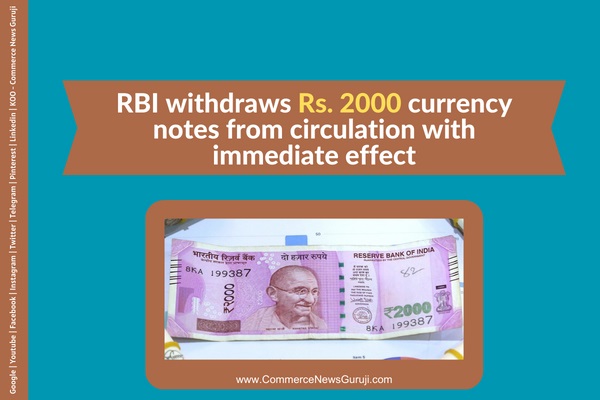In pursuance of the “Clean Note Policy” of the Reserve Bank of India, the Rs. 2000 denomination banknotes shall be withdrawn from circulation. The Rs. 2000 banknotes will continue to be legal tender.
Accordingly, to implement the decision stated above, the following plan of action has been formulated which, the banks shall follow meticulously:
1. All banks shall discontinue issue of Rs. 2000 denomination banknotes with immediate effect. ATMs/Cash Recyclers may also be reconfigured accordingly.
2. The facility for deposit and/or exchange of Rs. 2000 banknotes shall be available for members of the public up to September 30, 2023.
3. With a view to minimise inconvenience to the public, to ensure operational convenience and avoid disruption of the regular activities of bank branches, all banks may exchange Rs. 2000 banknotes upto a limit of Rs. 20,000/- at a time.
4. Business Correspondents (BCs) may also be allowed to exchange Rs. 2000 banknotes upto a limit of Rs. 4000/- per day for an account holder. For this purpose, banks may, at their discretion, enhance the cash holding limits of BCs.
5. While crediting the value of Rs. 2000 notes to Jan Dhan Yojna Accounts / Basic Savings Bank Deposit (BSBD) Accounts, the usual limits will apply mutatis mutandis.
6. The banks shall to the extent feasible make special arrangements to reduce inconvenience to the senior citizens, persons with disabilities and women seeking to exchange/deposit Rs. 2000 notes.
7. Deposit of Rs. 2000 banknotes into accounts maintained with all banks can be made in the usual manner, that is, without restrictions and subject to compliance with extant Know Your Customer (KYC) norms and other applicable Statutory requirements. The banks shall also be required to comply with Cash Transaction Reporting (CTR) and Suspicious Transaction Reporting (STR) requirements, where applicable.
8. To give time to the banks for preparatory arrangements, members of the public have been requested to approach the banks/branches from May 23, 2023 for availing exchange facility. Deposit of Rs. 2000 banknotes may continue as per the normal banking practice.
9. For providing deposit/ exchange facility to people residing in remote/ unbanked areas, banks may consider using mobile vans, if necessary.
10. Banks holding Currency Chests (CCs) shall ensure that no withdrawal of Rs. 2000 denomination is allowed from the CCs. All balances held in the CCs shall be classified as unfit and kept ready for dispatch to respective RBI offices.
11. All banknotes in this denomination received by the banks shall be sorted immediately through Note Sorting Machines (NSMs) for accuracy and genuineness and deposited in the currency chests under the Linkage Scheme or kept ready for dispatch to the nearest Issue Office of RBI.
Background:
Rs. 2000 denomination banknote was introduced in November 2016 under Section 24(1) of RBI Act, 1934 primarily to meet the immediate currency requirement of the economy after withdrawal of the legal tender status of all Rs. 500 and Rs. 1000 banknotes in circulation at that time. With fulfilment of the objective of introduction of Rs. 2000 denomination and availability of banknotes in other denominations in adequate quantity, printing of Rs. 2000 banknotes was stopped in 2018-19.
Further, majority of the Rs. 2000 denomination notes were issued prior to March 2017, have completed their estimated lifespan, and are not observed to be commonly used for transactions anymore. Therefore, it has been decided that, in pursuance of the “Clean Note Policy” of the Reserve Bank of India, the Rs. 2000 denomination banknotes shall be withdrawn from circulation. The Rs. 2000 banknotes will continue to be legal tender.
(Also read: 10 tips for using your Credit Card smartly)
(Also read: 10 best investments for Tax Saving)
(Also read: Hotels or Restaurants cannot add Service charge automatically or by default in the Food bill)
(Also read: Government sets penalty upto Rs. 50 Lakhs for misleading advertisements and endorsements)
Disclaimer: The above post includes some content used from RBI website and executed on this website for fair use only. As this website is of educational nature, hence the content is used for education and awareness to the public.

